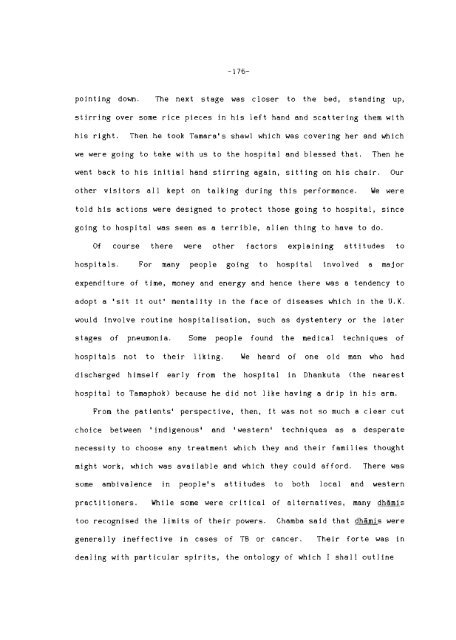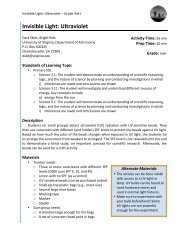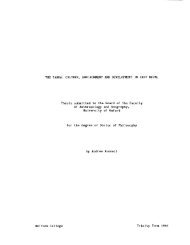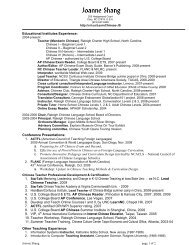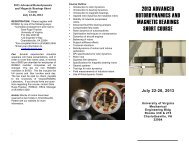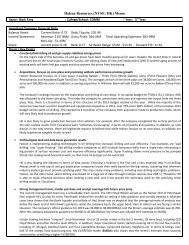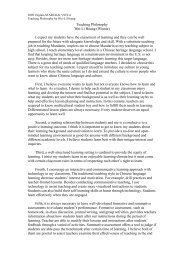- Page 1 and 2:
THE YAKHA: CULTURE, ENVIRONMENT AND
- Page 3 and 4:
Dedicated to the memory of MART IN
- Page 5 and 6:
Without the funding of the ESRC it
- Page 7 and 8:
CONTENTS CHAPTER ONE: Searching for
- Page 9 and 10:
CHAPTER SEVEN: Other Worlds: Inside
- Page 11 and 12:
List of Plates After Page P!ate 1:
- Page 13 and 14:
, Map I: Nepal, showing location of
- Page 15 and 16:
March 1989 and October 1990, in the
- Page 17 and 18:
to be social?", friends asked. "Enc
- Page 19 and 20:
people whom the project was designe
- Page 21 and 22:
was no reason why SEADD (who liked
- Page 23 and 24:
presence of institutions at the loc
- Page 25 and 26:
I did have the opportunity to under
- Page 27 and 28:
(Map 2). We decided to make Kathman
- Page 29 and 30:
felt I had scored a small victory o
- Page 31 and 32:
Chainpur (see Map 3). It was on the
- Page 33 and 34:
primary level teacher at the Tamaph
- Page 35 and 36:
quest ions concerned wi th language
- Page 37 and 38:
p 5: KHARDEP map of Tamaphok penchy
- Page 39 and 40:
to visit during the day. Our own da
- Page 41 and 42:
learn the Yakha language, our progr
- Page 43 and 44:
week into his palm to cover the ext
- Page 45 and 46:
make enquiries. I found out about a
- Page 47 and 48:
a research assistant after school.
- Page 49 and 50:
to collect a VSO (Voluntary Service
- Page 52 and 53:
towns). Demonstrations and strikes
- Page 54 and 55:
post-mortem exemfnations could be c
- Page 56 and 57:
Kathmandu and elsewhere, and there
- Page 58 and 59:
sending to Kathmandu, a lucky find
- Page 60 and 61:
Our return to Tamaphok after this w
- Page 62 and 63:
een his concern: ie there has been
- Page 64 and 65:
of the ncrude distinction between '
- Page 66 and 67:
with their environment' ) and ask w
- Page 68 and 69:
Notes: Chapter One 1. I should expl
- Page 70 and 71:
higher administrators in Europe, mi
- Page 72 and 73:
Chapter Two: Ecological Anthropolog
- Page 74 and 75:
despite long-term involvement in th
- Page 76 and 77:
This chapter looks at how many of t
- Page 78:
Poffenberger (1980) sees a direct a
- Page 81 and 82:
The major variable which Macfarlane
- Page 83 and 84:
the mindless instigators of denudat
- Page 85 and 86:
ather than regularities in the phen
- Page 87 and 88:
contradict ions" (Ellen, 1979b: 21,
- Page 89 and 90:
position which is too broad to be u
- Page 91 and 92:
Steward was predated by Meggers (19
- Page 93 and 94:
value of an ecosystemic approach in
- Page 95 and 96:
small population may be more adapti
- Page 97 and 98:
describes as ' mangeurs du bois' [e
- Page 99 and 100:
Rappaport thus argues for the need
- Page 101 and 102:
eing trivial and dealing only with
- Page 103 and 104:
What we have, then, is ecological a
- Page 105 and 106:
Others have suggested that there ma
- Page 107 and 108:
were unique is to deny an answer to
- Page 109 and 110:
1987:86>. Sometimes identity derive
- Page 111 and 112:
and funeral and other ritual obliga
- Page 113 and 114:
suggests. Varioari for the Yakha wo
- Page 115 and 116:
Plate 7: Yakha woman, Kami boy Plat
- Page 117 and 118:
Certainly Yakha identity, their sen
- Page 119 and 120:
Bahadur one day; "doesn't it smell
- Page 121 and 122:
inland, and came into contact with
- Page 123 and 124:
land amongst kinsmen and adjudicati
- Page 125 and 126:
part. We shall then go on to look a
- Page 127 and 128:
settlers was from a pattern of shif
- Page 129 and 130:
PanciWa t Ankhibhui Maml i ng Tamap
- Page 131 and 132:
At the local level, the figures for
- Page 133 and 134:
P6-c Khap~ar (1 it, 'Five Skulls' )
- Page 135 and 136:
etween the two tribes were to be ta
- Page 137 and 138:
greater extreme the Yakha of Kingri
- Page 139 and 140:
People did not seem unduly perturbe
- Page 141 and 142:
take food, and to whom one could gi
- Page 143 and 144:
However, despite the influence of c
- Page 145 and 146:
1979:53). We were told of two other
- Page 148 and 149:
circumspection, A particularly stro
- Page 150 and 151:
striking in terms of the dichotomy
- Page 152 and 153: ut never eaten. It should be noted
- Page 154 and 155: Dasai-, TihBr, S8un San.krBnti, M B
- Page 156: splattered with whitewash, and it o
- Page 159 and 160: its scrupulous egalitarianism in ap
- Page 161 and 162: In preparation, a large square of c
- Page 163 and 164: practitioner) stepped forward and d
- Page 165 and 166: Tihtir, their distinctive smell bei
- Page 167 and 168: Plate 12: The predh6n v6-c gives Ti
- Page 169 and 170: marked, clockwise from top left, wi
- Page 171 and 172: e honoured, and proceeding through
- Page 173 and 174: would tend to make feeble excuses a
- Page 175 and 176: ice and dahi which had been the mar
- Page 177 and 178: also served. The house was speciall
- Page 179 and 180: there was no simple 'melting pot' a
- Page 181 and 182: not at the material level conceived
- Page 183 and 184: although it has been observed among
- Page 185 and 186: amongst the more sophisticated memb
- Page 188 and 189: Yakha came into Tamaphok in search
- Page 190 and 191: muntum were essentially the same, w
- Page 192 and 193: Sagant (1976:58) admits that "in th
- Page 194 and 195: There were few specific things mark
- Page 196 and 197: arkhi had to be of a different chor
- Page 198 and 199: Plate 16: Chambog dh6ri5 in the mid
- Page 200 and 201: millet would be enough to satisfy a
- Page 204: The story of O'B'mi was told to us
- Page 207 and 208: of Tenbe'na was recited as follows:
- Page 209 and 210: such as me,ca cydtj, which were sai
- Page 211 and 212: and Yasokeni, all played to in a ba
- Page 213 and 214: y the religious practitioners who t
- Page 215 and 216: 2. Cf, A1 len: "When I arrived in t
- Page 217 and 218: 5.2 The Yakha House The house in wh
- Page 219 and 220: whitewash in painting their houses,
- Page 221 and 222: me Porch The porch (omphu) mediated
- Page 223 and 224: in this. People would put small wov
- Page 225 and 226: to a terrace (Plate 20) which overl
- Page 227 and 228: 21). Ground level was part animal e
- Page 229 and 230: clans, lineages and familial roles.
- Page 231 and 232: clan. Yet one five-year old girl si
- Page 233 and 234: Despite the origins of the relation
- Page 235 and 236: are no women mentioned apart from K
- Page 237 and 238: due, was to use their kinship term
- Page 239 and 240: number of relationships covered by
- Page 241 and 242: strife and tension. Quite often the
- Page 243 and 244: situation was often only a temporar
- Page 245 and 246: 5.4 The Household Economy The expec
- Page 247 and 248: labourers'). Some distinction betwe
- Page 249 and 250: kind of previously cooked snack foo
- Page 251 and 252: parma workers was a source of extra
- Page 253 and 254:
een the collaboration of groups of
- Page 255 and 256:
Loans, Debts and Indigency We ident
- Page 257 and 258:
'traditional' patterns were changin
- Page 259 and 260:
suggests, is a trait shared by all
- Page 261 and 262:
Kirsten Johnson and her col leagues
- Page 263 and 264:
karele variety grown lower down, an
- Page 265 and 266:
also said to keep plants such as du
- Page 267 and 268:
whereby people and goods came into,
- Page 269 and 270:
and September, before the rice plan
- Page 271 and 272:
few weeks ear!ier during Dasai-> to
- Page 273 and 274:
maize planting time in the beginnin
- Page 275 and 276:
y performing a pul to pokta cyao in
- Page 277 and 278:
when his parents died, was granted
- Page 279 and 280:
trees served as an important fodder
- Page 281 and 282:
valley). There was at that time no
- Page 283 and 284:
were said to be found where tigers
- Page 285 and 286:
causes of forest depletion. Many pe
- Page 287 and 288:
family we interviewed could remembe
- Page 289 and 290:
ecological basis of the societies i
- Page 291 and 292:
However, our over-r id ing impress
- Page 293 and 294:
3. The surprise which some anthropo
- Page 295 and 296:
Chapter Seven: Inside-Out: Other Wo
- Page 297 and 298:
N.R. Shrestha, 1982, 1985a, 1985b;
- Page 299 and 300:
usinesses were located near them, T
- Page 301 and 302:
Plate 26: Walking through the fores
- Page 303 and 304:
Adding to the sense of Basantapur a
- Page 305 and 306:
Plate 28: Sansare Mude bazaar Plate
- Page 307 and 308:
Khola valley and to the Himalaya, a
- Page 309 and 310:
Annual Fairs In addition to the reg
- Page 311 and 312:
verses, these were not generally kn
- Page 313 and 314:
8 Tapai- arth ffarnuhos (Promise yo
- Page 315 and 316:
problems, The fundamental importanc
- Page 317 and 318:
in the district. In our studies of
- Page 319 and 320:
clothing from abroad was much in ev
- Page 321 and 322:
friend of his. This annual military
- Page 323 and 324:
Pakistan war and remembered the con
- Page 325 and 326:
everyone, As potential wage labour
- Page 327 and 328:
service and bought land in the same
- Page 329 and 330:
money paid agents in Kathmandu who
- Page 331 and 332:
people concerned, and how the outsi
- Page 333 and 334:
and this, perhaps, made marriage ac
- Page 335 and 336:
jerked by the strings of broader so
- Page 337 and 338:
is ...p rimarily due to the growth
- Page 339 and 340:
Sanskritizat ion had been part of Y
- Page 341 and 342:
Plate 30: Listening to music Plate
- Page 343 and 344:
as a backwater, everyone agreed tha
- Page 345 and 346:
students coming from some distance
- Page 347 and 348:
For students in ward 9, Okhre-Bhote
- Page 349 and 350:
The teachers also administered a sc
- Page 351 and 352:
the school. The curriculum followed
- Page 353 and 354:
see the spatial relationship betwee
- Page 355 and 356:
King Mahendra in 1960 after he accu
- Page 357 and 358:
Plate 32: Pradhen P8-c issuing citi
- Page 359 and 360:
Outside, people started getting exc
- Page 361 and 362:
muscle with regard to its de jure c
- Page 363 and 364:
after festivals and somewhat lackad
- Page 365 and 366:
As well as the ANM, a students' ass
- Page 367 and 368:
Ths school was a central forum for
- Page 369 and 370:
of the po!itical struggle, despite
- Page 371 and 372:
the ambiguously regarded superpower
- Page 373 and 374:
of their shop with stout wooden pla
- Page 375 and 376:
section looks briefly at how these
- Page 377 and 378:
for individuals within the prevaili
- Page 379 and 380:
particular ward, Books and other me
- Page 381 and 382:
e overturned: the visiting BNMT wor
- Page 383 and 384:
wondered whether everyone was likel
- Page 385 and 386:
that, with his influence, a nascent
- Page 387 and 388:
Newang, President of the Front. (Hi
- Page 389 and 390:
I argued, are particu!arly pertinen
- Page 391 and 392:
Yakha, I have produced a text which
- Page 393 and 394:
Kathmandu where she enrolled in Eng
- Page 395 and 396:
a'wa a a achia ach~ tamum ach~ tapu
- Page 397 and 398:
ha emabu bhasnik bhusudna ca came c
- Page 399 and 400:
dukka mene jogan duna duna du-ru Da
- Page 401 and 402:
i , kma i , mma ka 'nir~o kacek kam
- Page 403 and 404:
leema lesnchi le.pma le,kma le*r]ma
- Page 405 and 406:
Plate 35: The Maya Khola valley
- Page 407 and 408:
pha 'me phak pharog phamne pha* bu
- Page 409 and 410:
uc un ucumphakr]a uha uhaoma ukma u
- Page 411 and 412:
Appendix I1 Interview Schedule (The
- Page 413 and 414:
Annual production: rice, maize, mil
- Page 417 and 418:
BIBLIOGRAPHY Adhikary, K. R, 1988,
- Page 419 and 420:
Brown, C. H. 1984. Languages and Li
- Page 421 and 422:
Doherty, V. S. 1975. Kinship and Ec
- Page 424 and 425:
Hitchcock, J , 1961, A Nepalese hil
- Page 426 and 427:
--- 1986b. Human Imapct on Some For
- Page 428 and 429:
Orlove, B. S. 1980. Ecological Anth
- Page 430 and 431:
Shrestha, K. 1984. Nepal i Names fo
- Page 432:
White, L.A, 1959. TheEvolutfon of C


